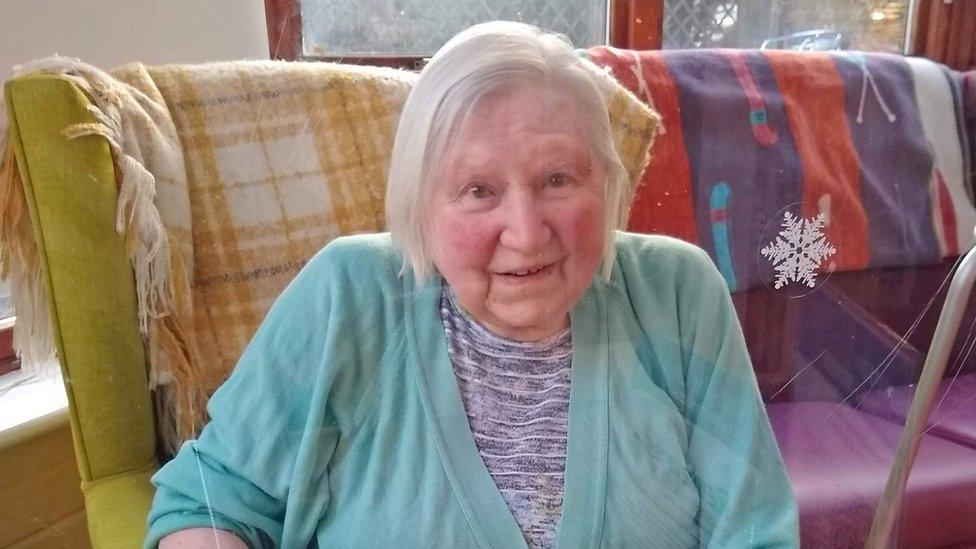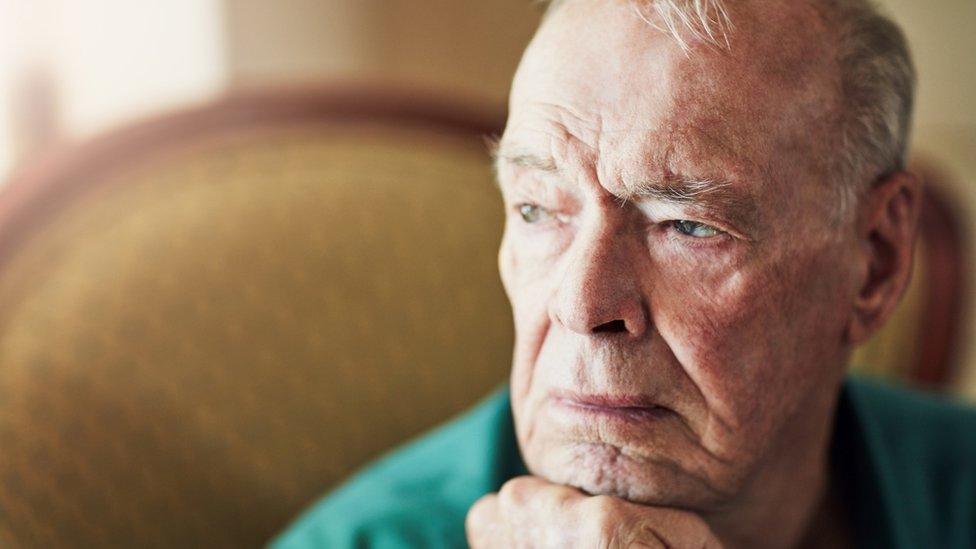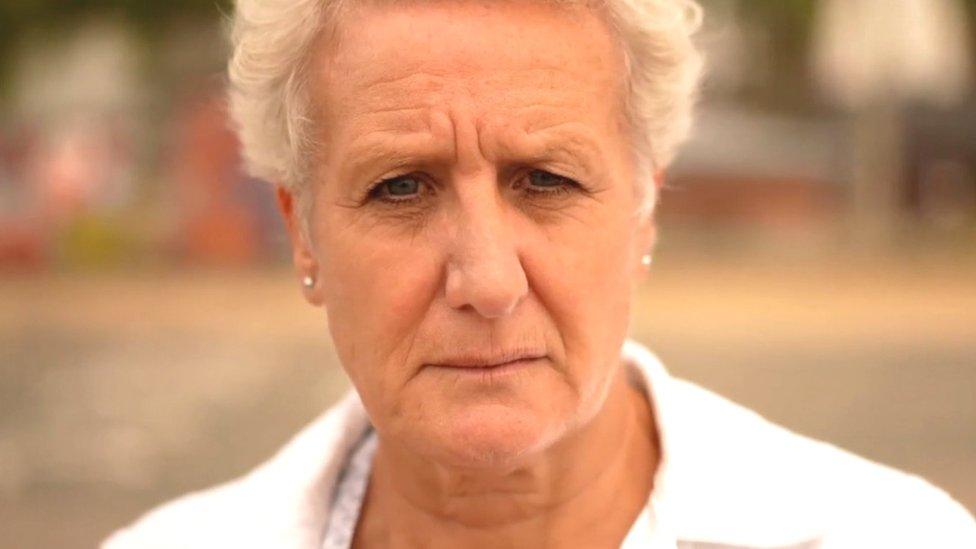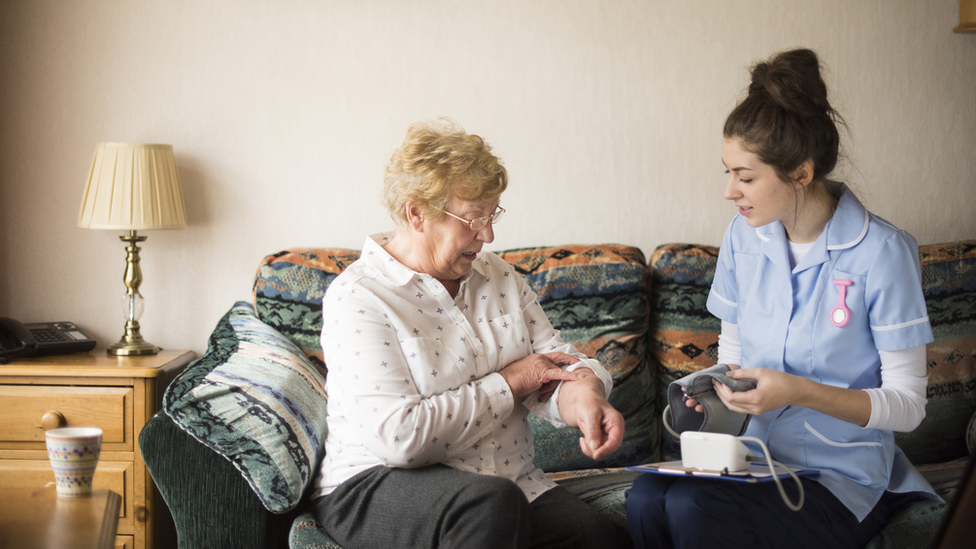Social care: 'It's too late for my mum, her house has been sold'
- Published

Betty has already sold her house to pay for her care
For thousands of people who need social care, raising the money to pay for it has meant taking life-changing decisions. Many have sold their homes, while others have given up work to look after their loved-ones themselves.
Now the government is raising taxes and proposing a cap on the amount people will pay. So what do those already using the care system make of the proposals?
'We'll be hit by a double whammy'
Betty, 88, has dementia and has lived in a care home since December 2016. She has sold her house to cover the tens of thousands of pounds needed to pay for her care.
But as she is already in a home, she will not benefit from the government's plans to cap costs at £86,000. It will come into force in England from October 2023, but it will not be backdated.
Betty's son, Gordon Brooks, from Gosport, Hampshire, describes his mother's £4,300-a-month fees as "horrendous". To pay for them, her house was sold and the proceeds were invested in shares.
But Gordon fears that rather than being helped by the government's new plans, the money set aside to pay for her care will be hit by further taxation.
As part of the proposals, shareholders will also have to pay the additional 1.25% in tax on the profits they make.
"We invested it to gain more and make it last longer but if the investment is taxed further it diminishes it so it's a double whammy," he said.
"She's well looked after and in relatively good health but the assets she has will only last a certain amount of time."
He says his mother will be contributing to the new scheme through the additional tax from her shares, but won't gain anything herself.
"Politicians have been saying for a long time that people shouldn't have to sell houses to pay for their social care. She has already had to sell her house.
"This new scheme is meant to help people in this position but it's doing the opposite for her. I'm not interested in inheriting the family silver, I'm interested in making sure she is kept in the home and looked after."
'£250,000 for four years of care'
Julie, from Manchester, says her mother, who has Alzheimer's disease, will have paid a quarter of a million pounds in care home fees by the time the government's plans come into force in October 2023.
She rents out her mother's house to pay for her care but she says that only covers a quarter of the fees.
"In order to meet these costs, I will have to sell her property," she says. "Her savings are all but depleted."
Julie, an only child, says her mother is well looked after but she doesn't think it's fair that some people pay for care fees and others don't. "£250,000 is a lot of money for just over four years of care," she adds.
Under the plans announced by the prime minister the NHS will get the bulk of the £36bn raised in the first three years, with £5.4bn going to social care in England.
But that balance is expected to tip towards social care in subsequent years as the £86,000 cap on costs introduced from October 2023 starts to require funding.
However, Julie says she is sceptical about how much of the money raised will end up going to social care. "Whilst I welcome that finally, care home fees will be capped, waiting another two years in the hope that there will be funding available once monies have been ploughed into the NHS gives me very little comfort, or indeed hope, that this will actually come to fruition.
"I totally understand and appreciate that the NHS needs support, but so does social care. Why, yet again, is social care the poor relation?"
'Mum's not a piece of luggage'
Sharon and her family are struggling to pay for her elderly mother's care after the money put together from selling the family home ran out.
She says the money spent on her mother's care has gone well beyond the proposed cap.
You can watch her talking about her situation, below.
Sharon says her mother has given everything she's got for her care
'They've kicked the can down the road'
Some carers who look after their family members feel they have been ignored by the government's proposals.
Norman Couch lives in East Sussex where he cares for his mother after she had a series of strokes which left her with limited mental capacity and movement in just one arm. He gets help from a carer three times a day for half an hour.
"This policy will not help me or fund the little help I get from carers - either me or my mother will still pay for it."
He gave up his job to look after his mother and he says family carers are saving the NHS £20,000 in looking after loved ones but "we don't get the help".
"It's a missed opportunity by the government - all they have done is kick the can down the road."
Related topics
- Published20 November 2022

- Published7 September 2021

- Published8 September 2021
